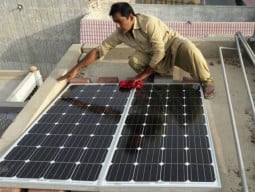
Women in the Swat Valley are working harder than ever to run their households.
To some extent this makes them happy, allowing them to reclaim lives put on hold during the militancy, which ended in July 2009 after a military operation, allowing tens of thousands of internally displaced persons (IDPs) to return, reports IRIN.
“We are no longer compelled to wear the suffocating blue burqas imposed by the Taliban, girls are back at school and women are working again in factories and colleges from which they were forced out,” said Aqila Khan, 42, a social activist from Mingora, who is once again wearing a white chadar.
But though militancy has receded, women in Swat carry a double burden. The devastating floods of 2010, followed by less intense but still damaging flash floods in 2011, took a big toll on agriculture, destroying maize. “This was our main crop,” farmer Riaz Khan told the media in Kabal.
The Swat district coordination officer said, “Reconstruction work in the valley following the floods is well on track”. Bridges have been built by the army with foreign donor support and some efforts have certainly been made to restore livelihoods.
But life is still difficult and women frequently bear the brunt. “Lots of men were employed by the tourist industry. Hotels and cafés were washed away in the 2010 floods, destroying all they had built after the insurgency, and then there were major agricultural losses in 2010 and 2011,” said Aqila.
Many women are struggling simply to put food on the table. “I sold the bangles I received on my wedding 10 years ago. It was all the gold we had but my husband had lost his job as a hotel waiter, and with the money we bought hens, goats and replanted vegetables,” said Salma Bibi, 30.
Her problems are not over, however. “My husband is out all day looking for work. He is desperate. I look after our three young children, tend to the animals and the fields, fetch water from a stream which is seven kilometres away from our village near Mingora, cut timber to cook and perform all household chores. Other women work like me too to bring in money - but by the end of the day we are worn out. Look at my blistered hands,” she said displaying her palms.
“I worry about the militants coming back because my sister and I were forced out of college for nearly two years and we cannot seem to catch up. This means we cannot help our elderly parents by earning an income in the coming years,” said Zaitoon Bibi, 18. Her brothers struggle to restore their fields and replant the peach trees they lost.
Many other women must take on the dual burden of earning an income and running the household as their husbands try to rebuild homes, lives and livelihoods. Given the acute losses experienced by the tourism industry, which employed tens of thousands, people are asking for more help.
“We have received no compensation and no help from anyone. We know that right now it is our wives who are keeping the households running. But this is unfair to them. We have to find a way to get back to work, and we believe the authorities must somehow help us,” said Sharafat Ahmed, 36, whose wife works as a schoolteacher and looks after the household and cattle.
“Things cannot continue like this forever. We also live in fear of another disaster and somehow normality has to be found here so that families can live with some peace of mind and without continuous strain,” he added.
Published in The Express Tribune, December 8th, 2011.
COMMENTS (1)
Comments are moderated and generally will be posted if they are on-topic and not abusive.
For more information, please see our Comments FAQ







































the better reality of women's life